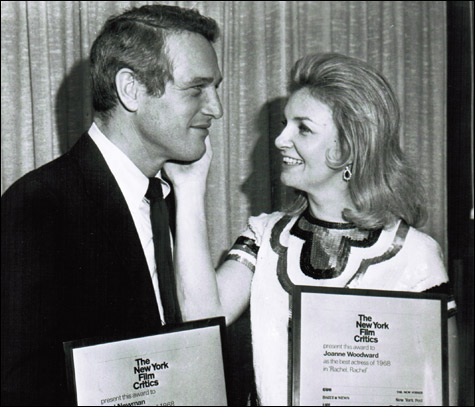
KEEPING A LID ON Newman, here with wife Joanne Woodward, didn’t have a page 6 kind of life, but Levy’s pages fly by nonetheless. |
| Paul Newman: A Life | By Shawn Levy | Harmony Books | 496 pages | $29.99 |
Among Shawn Levy's books is one of my favorite film bios, King of Comedy, with crazy-guy Jerry Lewis, so show-off goofy and schmaltzy, spilling all on every exuberant, excessive page. Levy, a talented veteran film critic for the Oregonian, has a far harder task with Paul Newman: A Life, the first biography of the great movie star since Newman's death last year. How do you create excitement around a star who was so guarded in his public personality, and so deeply embarrassed about being a male sex symbol? For Newman, there was no more excruciating affront than for a stranger, usually a randy woman, to ask him to remove his sunglasses so she could peer into his glacial blue eyes. He felt harassed, he said, like "a piece of meat."
Newman wasn't particularly funny, and he wasn't a thinker in a catchy, obviously interesting way. He could go on about acting methodology, or about auto engines, or about nuclear-arms pacts, but none of that makes for exciting copy. His love life? It was, for decades, his wife, Joanne Woodward, and their connubial problems were kept private. For this Hollywood star, what happened in Connecticut, where they resided, stayed in Connecticut.
So what does Levy do? He sticks to the facts, going through the actor's life, plowing through the 50-odd films and evaluating their worth. His writing is crisp, smart, and incisive, and the pages fly by, even if Newman's time on earth was rarely page 6 material. Only twice did he become fodder for the tabloids. In 1968, he was discovered having an affair with a journalist divorcee. And in 1978, his adult son, Scott Newman, was found dead from drugs and alcohol.
He came from a functioning, prosperous Cleveland family in estimable Shaker Heights. He went to a fine school, Kenyon College, pledged to a fraternity, did well in dramatics. Later on, he got an MFA from Yale. He wished he could have been an athlete, though that disappointment was erased when he became an accomplished race-car driver. He did have one abiding regret: his dad died early and never knew that Paul would amount to anything big.
The acting? Even that came fairly easy. Newman went quickly from Yale college performances to testing out the Method on the New York stage to being invited to Hollywood and becoming, in the 1950s, an instant movie star. He was annoyed, and justly, when people regarded him as a junior-level Marlon Brando. Unlike others from the Actors Studio, Newman never appropriated the mumbles and scratches of the Brando style; he saw himself as more clean-cut and collegiate than the blue-collar Brando persona. By the '60s, he had bypassed Brando in Hollywood popularity, moving deftly from artsy realism (The Hustler, Hud) to the dream-factory mainstream (Butch Cassidy and the Sundance Kid, The Sting, Cool Hand Luke).